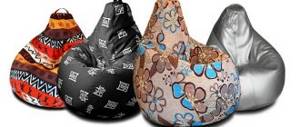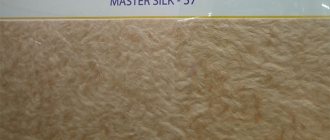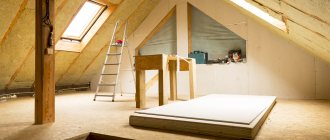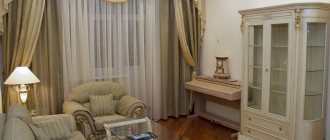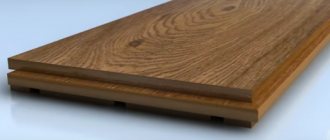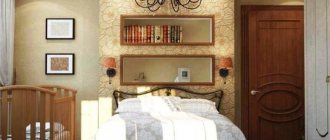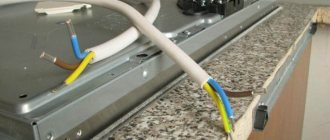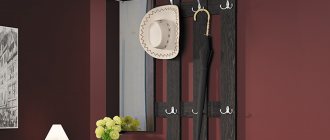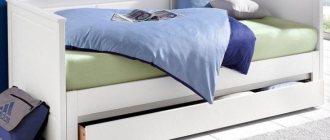There is nothing more annoying than having a bad night's sleep due to your furniture squeaking. In any case, it is unlikely that the creaking of any furniture in your home will make you happy. It always brings discomfort. However, the good thing is that with such a problem there is no need to spend additional money and purchase new furniture to cope with the squeak. In our article you will learn about the possible causes of squeaking furniture.
Why does furniture squeak?
If we are talking about furniture made of wood, then creaking can occur absolutely anywhere; in order to accurately determine the source, you will need to use the following recommendations. However, you should first consider the possible places where squeaking may occur. These include:
- Connection of corner elements;
- In areas where the legs come into contact with the furniture frame;
- At a slatted base made of wood;
- From contact of the mattress with the frame;
- Spring mattresses are especially susceptible to squeaking;
- Feet on a crooked floor.
Let's try to understand how the creaking of the bed occurs. Many people learned in physics classes at school that during friction, heating occurs and this provokes such squeaks. Wood furniture can shrink and create joints between parts. Such parts begin to rub against each other, which creates unpleasant sounds. If the furniture has been serving you for a long time, it may seem that the creaks are simply unbearable. That is why during the inspection you need to listen carefully to each element.
Why does the door or floor in the house creak?
Doors
Most often, superstitions concerned doors. It is clear that old wood can crumble over time, and poorly fitted parts rub against each other with an unpleasant grinding noise. This state of the house speaks of poverty and “handlessness” of the owner, and therefore predicts life difficulties for the inhabitants of the home. It is much worse if a sudden problem arises.
- Old people in the villages said that there is an exact sign: a door creaks, which used to open easily and silently - there will be trouble!
Floor
Not only long-awaited guests, relatives, friends, but also evil spirits entered the house through the door and threshold. The time for their walks is at night, when living people retire. In silence, any sounds are heard especially clearly; they give away uninvited visitors. An invisible hand knocked on the window or pulled the door handle, the floor in the house creaks - a sign signals a visit from otherworldly entities. It is possible that this is a brownie wandering around (to “cajole” him and calm him down, housewives left some treats near the stove).
No mysticism?
In fact, wood has the ability to react to changing air humidity, swell and slightly increase in size. Therefore, unexpected sounds can be explained without any mysticism. The floors are creaking - signs advise preparing for a long period of bad weather, rain, thunderstorms. The same goes for creaking furniture or window frames.
Quick methods to get rid of squeaks
- Cover the frame support bars with plenty of clothing. Choose something you haven't worn for a long time. The fabric will prevent the orthopedic base or mattress from coming into contact with the bed frame and creaking.
- Use a cork seal, this will help get rid of unnecessary joints in a bed with a wood frame. Inspect your bed for any joints where the orthopedic base or mattress could potentially “roll” and come into contact with the bed frame. You will need to glue cork sealant at these joints so that all the furniture pieces fit together neatly.
- Place a book under the mattress (near the source of the squeaking noise). If the source is located near the support bars, remove the mattress. Later, place the book on the creaking bar. After that you will need to return everything as it was.
- If the cabinet doors squeak, install new hinges for the doors. Install new hinges (choose long screws). There will be no trace left of the squeak.
creak
creak
CREAK - spit, - drink; nsv.
1. (how). Make a creaking noise (1.S.). S. chair. S. boots. The gates are creaking. The spruce creaks in the wind. The earth creaks in your teeth. Somewhere in the swamp a corncrake creaks. S. with teeth (also: to express anger, to get angry).
2. Razg. Grumble, whine, etc. (usually in a squeaky voice). The old woman has been creaking (grumbling) since the morning. The child is creaking: his teeth are cutting (he is capricious, crying).
3. Joking. Live somehow, barely maintaining your existence, your strength. Grandfather creaks somehow. How is your health? - I’m creaking slowly.
◊ Like an ungreased (ungreased, ungreased) wheel squeaking. 1. About creaking unpleasant sounds. -2. Things that go hard don't go well.
◁ Creak, -well, -no; St. One-time (1 digit). The door creaked. Creaking, -i; Wed
Source: Kuznetsov’s Large Explanatory Dictionary of the Russian Language on Gufo.me
Meanings in other dictionaries
- creaking - creaking (creaking · region), creaking, creaking, · incredulity. (to creak). 1. than and ·without·additional. Make a squeak. “The snow underfoot creaks from the frost.” Ryleev. “Riding up the mountain, a full cart creaks with sheaves.” Nekrasov. Ushakov's Explanatory Dictionary
- creak - Creak/é/t. Morphemic-spelling dictionary
- creak - see >> sound Abramov's Dictionary of Synonyms
- creak - spelling creak, -ply, -pit Lopatin's Spelling Dictionary
- creaking - creaking, - spitting, - drinking; nesov.; CREAK, -well, -no, Sov., that to whom and without additional. Talk, say. Why did you squeak there? Explanatory dictionary of Russian argot
- creaking - creaking, spitting, drinking; nesov. 1. Make a squeak. Boots squeak. The pen creaks on the paper. S. teeth. The old man doesn’t listen to anyone and grumpily creaks his voice (translated: speaks in a creaky voice; colloquial). 2. transfer Ozhegov's Explanatory Dictionary
- creak - See creak Dahl's Explanatory Dictionary
- creaking - - spitting, - drinking; nesov. 1. Make a squeak1. The floor creaks. Boots squeak. □ The carts creaked as they pulled out onto the road. Chekhov, In the ravine. The snow crunches and creaks deliciously under felt boots. Gladkov, A Tale of Childhood. || how. Make a creak. Grind your teeth. Small academic dictionary
- to creak - to creak. nepereh. 1. Make a squeaking sound. || Make a sharp sound, like a creaking sound (about birds). || trans. decomposition Speak in a harsh, unpleasant voice; grumble. 2. transfer decomposition To live, barely maintaining your existence, your strength. Explanatory Dictionary by Efremova
- creaking - Creaking, creaking, creaking, creaking, creaking, creaking, creaking, creaking, creaking, creaking, creaking, creaking, creaking, creaking, creaking, creaking, creaking, creaking, creaking, creaking, creaking, creaking, creaking, creaking... Zaliznyak's Grammar Dictionary
- Blog
- Jerzy Lec
- Contacts
- Terms of use
© 2005—2020 Gufo.me
Psychological problems
Teeth grinding in 80% of cases is a reaction to a person’s emotional state. It is observed under stress, an excited nervous system, and excessive emotional stress. With depression, the patient will constantly have neuromuscular tension and increased brain activity.
During sleep, involuntary spasms of the maxillofacial muscles occur if a person is very excited when falling asleep. Young people who are focused on promoting business, increasing income, most often experience negative psychological effects. To find out why a person grinds his teeth in a dream, the patient’s psycho-emotional state is first checked. Here you need the advice of a psychotherapist, but a mental disorder will not be considered in this case, although it may mean neurosis.
What is bruxism in adults
The clinical manifestations of the pathology are quite specific. During a night's sleep, a person suddenly begins to make unpleasant sounds with his teeth. The attack does not last long: from a few seconds to two minutes. The pressure increases, the frequency of myocardial contractions increases, and breathing becomes difficult. Attacks can be repeated several times a night, and an increase in frequency will be observed after excessive physical exertion or a stressful situation.
People may not know about their problem; their loved ones tell them about it. Men are more susceptible to this condition during night sleep, but teeth grinding also happens during the day.
This problem has three names: bruxism, odonterism, Carolini phenomenon.
According to psychologists
Long-term reactions of the body, expressed in anger, grief, sadness or fear. All these conditions gradually contribute to the development of neurosis, depression or a stressful situation. Constant negative emotions, associated with increased excitability or aggression, can also play a big role.
Constant overexertion, leading to stiffness of the jaw, facial muscles and teeth. During the daytime, this can be controlled by forcing yourself to relax. But at night, nerve impulses are transmitted with the same force as the central nervous system is excited.
Teeth grinding under stress occurs periodically. This becomes a signal that changes in the environment are already occurring in the body. The neurosis is characterized by frequent and painful grinding at night.
Why can’t you lubricate the chair with grease?
Many users, when a chair creaks, ask themselves: what can and cannot be used to lubricate the chair so that it does not creak? The most common lubricant in this case is grease or lithol. But you can’t lubricate the chair with either one or the other.
Litols and solidols are a thick oily mixture. When these compounds are used on bearings in an enclosed space, they last a long time and serve as an excellent protective medium against wear of parts.
However, when used in an open space (on top of the mechanism), solid oil attracts dust, which settles on the surface. In the future, the creaking will not only intensify, but the parts will also wear out due to the presence of abrasive particles. In addition, the grease is quite thick, which does not allow it to penetrate deep into the source of the creaking. When using such a substance, as a rule, the creaking does not disappear.
Litol negatively affects aluminum (corrodes it), which is often an integral part of the design of the chair mechanism.
Why does the disease develop?
Dentists name several causes of bruxism. One of them is the habit of gnawing or chewing hard objects: a pencil, a pen. Although it can most likely be attributed to the consequences of the disease.
We suggest you familiarize yourself with Fungus in a child’s mouth
Experts say stress is the likely cause of teeth grinding. Strong clenching of the jaw is a normal reaction to it. Overexcitation of the body occurs when there is increased brain activity, strong anticipation of something, or taking stimulants (alcohol, drugs).
In addition to stress, night or daytime teeth grinding is a consequence of dental anomalies (bad bite, missing teeth), Parkinson's or Huntington's disease, and insomnia. Strong clenching of teeth is typical for people whose work requires increased attention and precise movements (surgeon, watchmaker).
Why do my bike brakes squeak?
A squeak is often heard when braking. In wet weather, both rim brakes (vibrake) and disc brakes squeak. And that's okay. As soon as they dry, the squeak will go away. But sometimes rim brakes squeak because the surface of the brake pads is dirty. To fix the problem, unscrew the pads, clean the braking surface first mechanically - for example, you can scrape the pads with a knife, wipe the rim with a rag - and then treat both with acetone. In addition, if the wheel turns eight, from time to time you will hear a not very loud shuffling. If the “eight” is weak, then just spread the pads a little; if it’s too big, it’s better to straighten it, yourself or at a service center.
